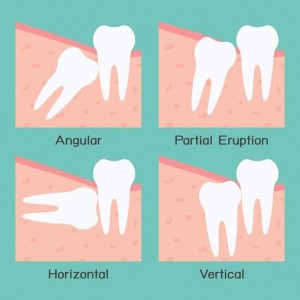Read on to find out about most common and frequently asked questions related to:
Wisdom Teeth
Why are they called Wisdom Teeth?
Wisdom Teeth are the third set of molars in the back of your mouth. They generally erupt after the age of 18. An age old myth since they arrive late in the mouth they are supposed to make the person wiser. Contrary to this myth, wisdom teeth have nothing to do with the person’s wisdom or even eye sight for that matter.
Is Wisdom Tooth extraction painful?
The patient will be given local anesthesia to numb the area of extraction. The anesthesia will remain for two hours after which the doctor will prescribe medicines to reduce any pain. It can be managed to make it as painfree as possible.
Do patients need to undergo a surgery?
Depends on the severity of the case, most wisdom teeth extractions do not require surgical intervention.
Does your vision decrease after getting your Wisdom tooth extracted?
This is a very common misconception wisdom tooth or any other tooth is not related to the person’s eye sight.
What if I do not get my wisdom teeth removed?
If wisdom teeth do not get extracted they can lead to the following issues:-
- Source of recurrent infections.
- Some patients might develop trismus i.e. inability to open your mouth.
- Damage to other teeth as the extra set of molars can push your other teeth around causing mouth pain and bite problems.
- Sinus issues as wisdom teeth can lead to sinus pain, pressure and congestion.
- Jaws can be at a risk of getting damaged as cysts can form around the new teeth.
- Inflamed Gums as the tissue around the area can swell up and be hard to clean.
- Swollen Gums can also need to cavities as they create pockets between the teeth that help bacteria to grow.
- Alignment can get impacted due to wisdom teeth as they cause problems of crowding other teeth and it becomes necessary to undergo treatment to straighten other teeth.
How long is the recovery/down time post extraction?
You can resume work as early as two hours post the surgery although the entire healing process takes about a week or 10 days, you don’t have to necessarily take a break at home and follow your doctor’s instructions. Here are some general tips that you can follow:-
- Eat soft foods like rice, pasta or soup.
- Gently open and close your mouth to exercise your jaw.
- Use moist heat for a sore jaw.
- Use an ice pack on your face to reduce swelling.
- Drink plenty of fluids.
- Brush your teeth on the second day.
- Take the prescribed medication to ease the swelling and pain.
- Always call your doctor if you get fever, pain or the swelling does not subside.
However the following are after care precautions:-
- Avoid drinking from a straw as sucking may loosen blood clots that help your mouth heal.
- Avoid rinsing your mouth harshly.
- A big no to eating hard, crunchy or sticky foods as they may affect the wound.
- Avoid Alcohol and Smoking as they can slower the healing process.
Can a diabetic/ heart patient extract a Wisdom Tooth?
The Dentist will require a fitness certificate and a consent form from your specialist or alternatively may run some blood tests before they proceed with the extraction procedure.
Does Wisdom Tooth extraction cause any changes to your facial features?
An extraction of a wisdom tooth might cause swelling for a few days. However as soon as it heals there won’t be any difference to your facial appearance. In fact your mouth will feel more comfortable and less crowded.

